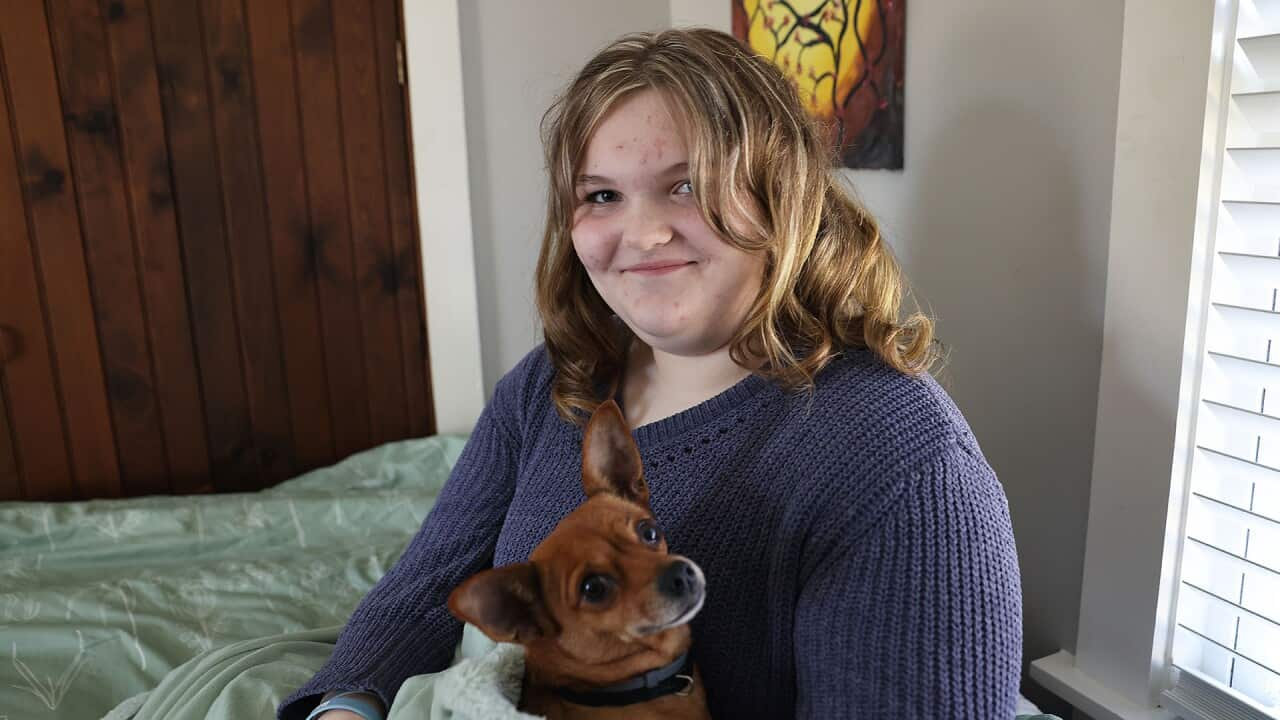Watch Dateline’s documentary 'Born Big' on SBS On Demand.
By her 12th birthday, Lexi weighed 116kg — almost three times the average weight of an American girl her age.
By the time she turned 13, she had 80 per cent of her stomach removed through bariatric surgery. She initially lost 29kg . But nine months after the operation, she regained some weight, and her intense hunger returned.
Lexi has MC4R gene deficiency. It disrupts the brain’s ability to regulate appetite, resulting in weight gain and a constant feeling of insatiable hunger.
Nearly three years after her surgery, Lexi, now 15, is exploring alternative options.
"I’d like to be a size where I can go out and play sports again, like I used to when I was younger," she says.
She was recently prescribed Wegovy, a weight-loss medication approved by the US Food and Drug Administration (FDA) for treatment of obesity in people aged 12 and older.

Wegovy belongs to the new class of injectable medications, originally used for the treatment of Type 2 diabetes but now FDA-approved for long-term weight management.
These drugs — primarily semaglutide (Wegovy and Ozempic) and tirzepatide (marketed under the brand names Mounjaro and Zepbound) — mimic GLP-1 hormones that regulate blood sugar and appetite, helping patients feel fuller for longer. They have been popularised by celebrities and on social media.
According to a 2024 study published in the Journal of the American Medical Association, prescriptions of these drugs for teens and young adults in the United States increased by 600 per cent between 2020 and 2023 — with the overwhelming majority being teenage girls.
One in five children and adolescents in the US are affected by obesity.
In January 2023, the American Academy of Pediatrics (AAP), the largest professional association of paediatricians in the US, updated its guidelines for treating children with obesity — for the first time in 15 years. It now recommends early medical interventions such as surgery and weight-loss drugs, in addition to lifestyle and behaviour changes.

Dr Fatima Cody Stanford, an obesity medicine physician and an associate professor at Harvard Medical School, says there’s been "a noticeable shift in recent years in how obesity and obesity medications are discussed within the paediatric and broader medical fields".
"There is growing recognition of obesity as a complex, chronic disease rather than a simple consequence of lifestyle choices," she says.
"The increasing visibility and acceptance of pharmacological treatments as legitimate components of obesity management reflect this change, although stigma still exists and must be continually addressed."
However, she says irreversible treatment such as bariatric surgery and indefinite use of medication at age 12 "must be approached with caution". It's important to balance the potential benefits of anti-obesity drugs against the unknown long-term effects, she says.
"I advise families to consider the improvement in quality of life and reduction in obesity-related health risks as significant benefits," she says.
"However, the psychological and emotional aspects, such as body image, potential dependence on medication, and identity formation, should be openly discussed."
High cost of weight-loss drugs
Lexi’s mum Brandy was initially against injectable GLP-1 drugs. "I wanted her to be a little older," she says.
Now, looking back, she says she would have started with medication rather than surgery for Lexi.
"Surgery is final ... there’s no reversing it," she says, adding that she believes bariatric surgery remains an essential option if other treatments fall short.

Bariatric surgery usually leads to substantial weight loss, but Lexi’s MC4R deficiency made her procedure far less effective.
"The conversation is changing," Brandy says. "I remember the first weight loss hospital we went to, they literally just gave us a portion plate and sent us home."
Now, "the availability and the options for people, it’s great, [and] it needs to keep going."
In April, Lexi was prescribed Wegovy. But the family has been locked in a battle with their insurance provider to secure even partial coverage for the medication’s cost.
Despite more weight-loss drugs hitting the market, many people in the US still can’t afford them.
A month’s supply of Wegovy, for example, can cost approximately US$1,350 ($2,100) — that’s over US$16,000 ($25,000) each year.
Medicare, the federal health insurance, is prohibited from covering weight-loss drugs by law. Most private health plans don’t cover them either, primarily, due to their high cost. Bariatric surgery, on the other hand, is covered by insurance companies.
In April, the Trump administration rejected a Biden-era proposal to expand Medicare coverage of anti-obesity drugs such as Wegovy.
However, GLP-1 drugs have become a target of a new executive order, signed by US President Donald Trump in May, aimed at lowering prescription drug prices, which are notoriously high in the US compared to other developed nations.
In the meantime, Lexi has seen some progress with an oral appetite suppressant, Qsymia, to help regulate her hunger. She’s lost weight and had her obesity reduced from class 3 to class 2.
But the journey has been mentally draining, she says.
"You just feel kind of defeated because, you’re like, 'what am I supposed to do when my options run out?"
Editor's Note: This is an updated version of an article that was first published in April 2024. Read the original story here.
Dateline is an award-winning Australian, international documentary series airing for over 40 years. Each week Dateline scours the globe to bring you a world of daring stories. Read more about Dateline
Have a story or comment? Contact Us


